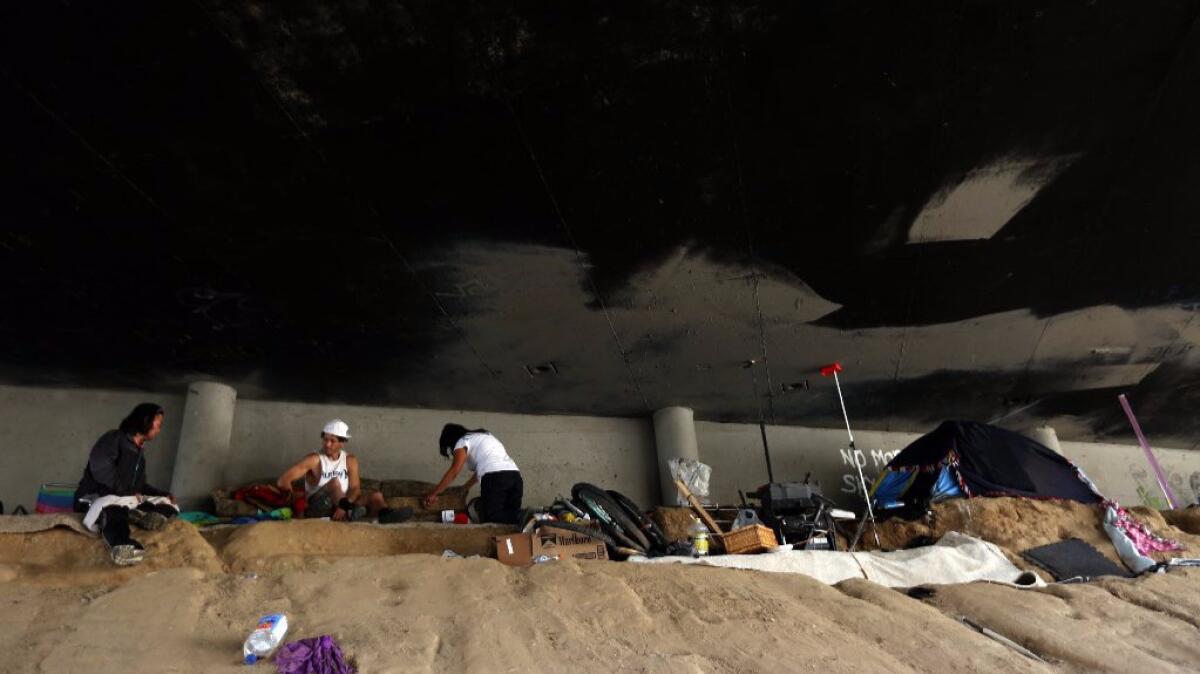L.A. could be barred from seizing and destroying homeless people’s items based on size

- Share via
Los Angeles could be barred from seizing and tossing out items belonging to homeless people based on an object’s size if a federal judge follows through on a tentative decision issued Tuesday.
The preliminary ruling by U.S. District Judge Dale S. Fischer would prohibit Los Angeles from enforcing a city law that bans people from keeping larger items — those that cannot fit into a 60-gallon container — on sidewalks and other public property.
But the city could still confiscate such belongings in “a number of circumstances, including when items are unattended, blocking the sidewalk or a threat to health and safety,” Fischer wrote.
Fischer wrote that a central question in the case is whether the city “can seize or destroy items because they are of a particular size.”
“The answer to that question is no,” she wrote.
The judge also said that homeless advocates are likely to succeed on their claim that the rule violates the 4th Amendment, which prohibits illegal seizures.
Attorney Shayla Myers, who is representing the plaintiffs, declined to comment because the ruling is not final. A co-founder of the outreach and advocacy group Ktown for All, one of the plaintiffs, said the group is “pleased by this ruling,” but declined to elaborate.
The federal lawsuit, filed by several plaintiffs including homeless individuals and Ktown for All, argued that the city rules and their enforcement are unconstitutional. They included numerous examples of confiscated items in their filings, including carts, a dog kennel, and a foam cushion and pallets to sleep on.
Ktown for All and the other plaintiffs asserted that city workers were seizing and destroying such possessions without giving homeless people a process to challenge their actions.
The provision targets “an incredibly vulnerable population: Homeless people who have no options but to live in tents and makeshift encampments throughout Los Angeles, and who often rely on these ‘bulky items’ to survive on the street,” the plaintiffs wrote in a motion seeking to stop enforcement of the rule.
City attorneys countered in a legal filing that the ban on bulky items is “a crucial component in the city’s duties to keep public spaces clean, safe and usable by all,” one made “all the more compelling today in the face of the health risks arising from the spread of the coronavirus.”
The right of the public “to use sidewalks for purposes other than storage cannot be ignored,” they added. “It is entirely reasonable to limit the size of items that a person can store in a finite public space.”
In the tentative ruling, Fischer said that the city’s seizure and immediate destruction of bulky items is unreasonable and that the city rule allowing such activities lacks “any procedural safeguards.”
The preliminary ruling would also bar the city from enforcing another provision that bans people from resisting or obstructing city employees who remove or discard items that violate city restrictions on items stored in public areas.
City Councilman Joe Buscaino, who represents a district stretching from Watts to San Pedro, said he was outraged by the tentative ruling. If finalized, he said, the ruling would force the city to spend money storing furniture, pallets, exercise equipment and other oversized objects found at homeless encampments.
Buscaino argued that the law being targeted by Ktown for All already allows homeless Angelenos to store a “reasonable amount of stuff” — blankets, toiletries and other objects that can fit inside a 60-gallon bin.
“We’re going to see an unlimited amount of personal property being stored on our sidewalks,” he said.
The tentative ruling would not bar the city from enforcing other parts of the municipal code that restrict items left on public property, including items that threaten public health or block wheelchairs from being able to pass on sidewalks. The city still has a chance to object to the tentative decision before the judge issues a final ruling.
More to Read
Sign up for Essential California
The most important California stories and recommendations in your inbox every morning.
You may occasionally receive promotional content from the Los Angeles Times.















